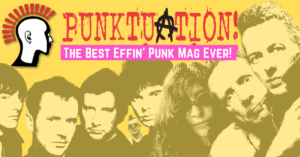How did one of the best and most successful independent labels in the history of punk rock come crashing down in 2012? Molly Tie investigates.
Nestled on the East Shore of San Francisco Bay is the city of Berkeley- a hip, liberal area that saw its population soar after providing a refuge for those fleeing the San Francisco earthquake of 1906 and has been a sanctuary of hippie progressivism ever since.
Perhaps it is not a surprise that a place that is famed for its links to alternative lifestyles, free-thinking and challenging authority would also find itself a nexus of the 1990s pop-punk explosion. Enter Lookout Records.
The local record label nourished and encouraged the burgeoning pop-punk scene of the late 1980s and early 1990s and had some incredible early successes. Unfortunately, despite being instrumental in the US pop-punk movement, dwindling sales and financial mismanagement meant that come 2012, this once-successful punk-powerhouse had to shut up shop.
So, what s the Lookout Records story?
In 1987, co-founder of Lookout Records Larry Livermore was a key fixture on the local San Francisco punk scene. He had his own punk band – The Lookouts (whose 12-year-old drummer was Frank Edwin Wright III, later to be more commonly known as Tre Cool) and he also had his own ‘zine (also called Lookout) both of which were popular in the area.

Larry was passionate about the scene that was developing locally, particularly the bands that played at The Gilman Street Project, which since opening in 1986, had become a focal point for the East Bay punk scene.
Bands like The Mr T Experience, Operation Ivy and Green Day were regular (and popular) fixtures there. So, with all the moving parts of a great punk wave lying about the place, Larry decided to bring them all together and create a label that would support, nurture, and promote these bands and get their music out into the wider community.
David Hayes, another supporter and chronicler of the East Bay punk scene, had originally wanted to start his own record label but decided to join forces with Larry Livermore. Between Hayes and Livermore, they both felt they had the local knowledge, contacts, and drive to create something wonderful.
Lookout Records was born – albeit on a shoestring budget.
Believe it or not from 1990 till early 1995, they ran the label out of Larry’s rented home in the small town of Laytonville.

“Things were going pretty well in Laytonville,” Livermore said in his blog post about the end of Lookout Records. “Granted, not having a telephone could be inconvenient, but it also meant that people couldn’t be calling me at all hours of the day and night with inane requests and insane demands.
“Having to travel ten miles to use a telephone or a couple hundred miles to go to punk rock shows was a nuisance, but it also forced me to think about how much I really needed to make that call or see that show.”
Keen to provide a central point for their bands to be together, the label’s roster quickly became a who’s who of local favourites including Green Day, Operation Ivy and Screeching Weasel.

A young lad, Chris Appelgren, became the labels first paid employee and would help with the stuffing of 7″ vinyl into sleeves and packaging records for mailorder. Chris soon became an integral part of the Lookout team. (more about that later.)
Releases came thick and fast in the first few years. The label released both Operation Ivy’s and Green Day’s first Eps- Hectic (1988) and 1000 Hours (1989) respectively. Green Day’s first two albums were released through the label (39/Smooth (1990) and Kerplunk (1992)) as well as albums by Screeching Weasel- My Brain Hurts (1991) and Anthem For A New Tomorrow (1993).

Green Day and Operation Ivy were very popular in the area, and the sales were higher than expected. These early successes allowed the label to keep expanding by signing more bands, and paying for studio time and promotional work.
By 1994 though, working conditions had “become intolerable” as four staff were now squeezed into Larry’s house as they tried to run what had rapidly become a multimillion-dollar business.
Of that time Larry said: “(1994) was the year that Green Day started becoming massive. I thought it was hilarious that we could be running a multi-million dollar company out of what looked like (and essentially was) a falling-down hippie hovel.
“It was even funnier when agents and managers and other record industry-types would have to traipse up our cracked concrete path and fling pennies at the upstairs window to get our attention (no, there was no doorbell, why do you ask?)”
It was time to move to bigger offices, but not because Lookout wanted to be seen as a “proper label’ – far from it.
“I didn’t have any great desire or reason for taking Lookout to the big city,” Larry said. “It’s just that I had decided to go back to college to finish the degree program I’d started many years earlier, and the label pretty much went wherever I did.”
The first few years in Berkeley were pretty good ones. Chris Appelgren, moved down to Berkeley shortly after Larry did, and on the first day of school, Larry met a fellow student, Patrick Hynes, who was to end up being the third partner in Lookout.

The money Lookout made was pumped back into the label to fulfil its raison d’être of pushing more punk out to the community, promoting bands, keeping a finger on the pulse of what was going on and shielding the scene from corporate fat cats.
But it wasn’t all rosy. An underpinning tenet of the scene was that mainstream equals bad and independent and low key equals good. Selling out to major labels, or compromising core punk rock principles (playing smaller, accessible venues with low ticket prices) was sure to have you shunned by the community.
Maximum Rock N Roll– a magazine and radio show, coordinated by founder Tim Yohannan– were influential in emphasising this key belief, some believe in a very pious and elitist way. The line between authentic punks and sell-out traitors was the ghost at the feast, a constant consideration for those who didn’t want to anger Yohannan and his readers.

The mainstream success of bands like Green Day, Rancid, Operation Ivy etc. was a double-edged sword for Lookout. On the one hand, once these bands became really popular, sales of their back catalogues skyrocketed, and Lookout was able to remain financially afloat purely based on the sales of the albums they still retained rights to.
By the end of 1995, Green Day’s two albums ‘1,039/Smoothed Out Slappy Hours’ and ‘Kerplunk’ had gone gold and Lookout had a million dollars in the bank.
“…and I would rather have been just about anywhere in the world than sitting behind that desk running that oh-so-successful record label,” Larry admitted.

This success also threatened to taint the whole label and threaten the label’s ‘punk ethos’ and its reputation for being independent. It also began to drive a wedge between the founders Livermore and Hayes, who had differing views on this subject.
Larry was quite open to the idea that bands would want to reach as big an audience as possible. Hayes was less enamoured with this. He was sympathetic to the Maximum Rock and Roll stance of feeling annoyed at bands outgrowing the local scene and moving to bigger labels, getting national radio play and making MTV friendly videos.
Dismayed by the direction of the label, Hayes bowed out in 1990 (despite Larry making a concerted effort to get him to stay) and started his own label- Very Small Records. Larry was left the sole captain of the ship.

“I remembered the words of David Hayes when he’d decided to leave the label back in 1989: “There’s too much golden light shining around this whole thing.” I hadn’t known what he’d meant then, and I’m not sure I do today, but obviously, he had been able to see what was coming and had decided not to be a part of it,” Larry said.
However, just a few short years later, Larry also decided to leave the label he co-founded.
“It was around the time while we were figuring out the taxes for 1995, that I realised I could afford to leave Lookout and perhaps never have to work again… It was a crazy feeling; I’d been poor most of my life, and it was difficult to even imagine being that financially secure. I remember sitting at my desk on Christmas Day – my life had gotten to a point where I really had nowhere else to go – and thinking, “I could walk out of here tomorrow and never come back again.”

There was one not-so-small hitch, though. Over the years, Chris Appelgren and Patrick Hynes had earned, in addition to their salary, a half interest in the company. If he were simply to take his share and leave, there wouldn’t be enough money left for them to operate Lookout.
“I still had doubts about whether it was in solid enough shape to hand over to them but I told myself, ‘Okay, I’ll leave, but not until I’m sure everything is organised as best as it possibly can be.’”
Larry has been asked pretty much continuously since then for his explanation as to why he left Lookout. He wrote a piece in 1999 where he made it clear that the initial fun and energy he felt at the beginning had given way to feeling like he was carrying an incredible burden.
After Larry Livermore left, Chris Appelgren took over as president with his wife Molly Neuman (another employee) became Vice President. The first year without Livermore at the helm Lookout had some luck in that Screeching Weasel resigned with the label.
Lookout then purchased Ben Weasel’s own label Panic Button Records and they acquired Palo-Alto based quartet The Donnas – releasing three of their albums between 1998 and 2001. However, the acquisition of Panic Button Records accrued a major financial loss for Lookout and The Donnas departed for Atlantic Records in 2002 Things began to unravel for the beleaguered punk label.
Other departures followed- The Queers, Pansy Division and Avail all left in the early 00s feeling that they were somewhat languishing on a label that wasn’t sure of its direction anymore.
In 2005 a huge blow occurred when Green Day announced that they were taking back the master rights for the material released on the label. They claimed continuous breach of contract and said they were owed royalties. Despite assurances from Lookout that they would receive them, their word was no longer seen as their bond.
Larry, publicly commented at the time that Lookout had been failing to pay Green Day and other bands for years and was apparently using the money to put out a series of “terrible records that very few people want to buy,”.
The label was forced to scale back their operation as a result of losing Green Day – one of their biggest cash cows.
The conventional wisdom was that independent labels were, by their nature, fairer than big record conglomerates and were able to offer more tailored and bespoke representation and support to the bands on their roster.
By not fairly paying their artists (as was alleged), and leaving some bands feeling that they were no longer getting the right support (as was the case with Pansy Division), Lookout were perhaps unwittingly demonstrating the very behaviour that larger labels were demonised for.
Between 2009 and 2012, the label continued to struggle and officially closed up shop in January 2012. Artwork, masters, and any other promotional items were returned to the bands and operations ceased. It was the end of an era.
From its inception, Lookout wrestled with a dilemma intrinsic to many independent operations – how to balance the need to earn money and achieve success for their bands whilst at the same time keeping things DIY and away from the pressures of entertainment capitalism.
Whilst Lookout may have gone out with a whimper rather than a bang, it undoubtedly played a huge part in the success of American West Coast pop-punk and left a positive and extensive legacy that spans over 20 years.
As Larry Livermore put it himself when reflecting on the fate of his label:
“Ah well, life goes on, even if great record labels don’t.”
List of bands Lookout Records released at least one EP or LP for:
- Alkaline Trio
- American Steel
- Ann Beretta
- Auntie Christ
- Avail
- The Avengers
- The Basicks
- Big Rig
- Bis
- Black Cat Music
- Black Fork
- Blatz
- The Bomb Bassets
- Boris the Sprinkler
- Born Against
- Bratmobile
- Brent’s T.V.
- Citizen Fish
- Cleveland Bound Death Sentence
- Common Rider
- Communiqué
- Corrupted Morals
- The Cost
- Couch of Eureka
- The Criminals
- Crimpshrine
- Cringer
- The Crumbs
- Cub
- The Cuts
- The Donnas
- The Dollyrots
- Downfall
- Dr. Frank
- The Enemies
- Enemy You
- Engine Down
- Even in Blackouts
- Evening
- Eyeball
- The Eyeliners
- Fifteen
- Filth
- The Frumpies
- Fuel
- Fun Bug
- Furious George
- The Gaza Strippers
- Gene Defcon
- The Go-Nuts
- Go Sailor
- Green Day
- The Groovie Ghoulies
- The Hi-Fives
- Hockey Night
- The Invalids
- Isocracy
- Jack Acid
- The Jackie Papers
- The Jimmies
- Judy and the Loadies
- Juke
- Kamala and the Karnivores
- The Lashes
- The Lillingtons
- The Lookouts
- Mary Timony
- Monsula
- The Mopes
- Moral Crux
- The Mr. T Experience
- The Ne’er Do Wells
- Neurosis
- Nuisance
- One Time Angels
- Operation Ivy
- The Oranges Band
- The Outrights
- Pansy Division
- Parasites
- The Pattern
- The PeeChees
- The Phantom Surfers
- Pinhead Gunpowder
- Pitch Black
- Plaid Retina
- The Potatomen
- Pot Valiant
- Pretty Girls Make Graves
- The Queers
- Rancid
- Raooul
- The Reputation
- Rice
- Riverdales
- Samiam
- Scherzo
- Screeching Weasel
- Servotron
- Sewer Trout
- The Shangri-Lows
- The Shotdowns
- The Skinflutes
- Skinned Teen
- Sludgeworth
- Small Brown Bike
- The Smugglers
- Spitboy
- The Splash Four
- Squirtgun
- Stikky
- Surrogate Brains
- Sweet Baby
- Swollen Boss Toad
- Ted Leo and the Pharmacists
- Tilt
- Toilet Böys
- The Tourettes
- Towards an End
- Troubled Hubble
- Twenty-Nineteen
- Uranium 9-Volt
- The Vagrants
- The Wanna-Bes
- Washdown
- Wat Tyler
- Worst Case Scenario
- The Wynona Riders
- Yeastie Girlz
- Yesterday’s Kids
- (Young) Pioneers
- The Zero Boys
Read more about Lookout Records in Larry Livermore’s Book “How To Ruin A Record Label
Enjoed this feature? Check out these.
I’m Molly Tie- I Love punk! I play drums (badly), write a lot about punk (not as badly) and I’m particularly interested in issues relating to women in the music scene.




 Did you know that we are 100% DIY? We run our own game. No one dictates to us, and no one drives what we can or cannot put on our pages – and this is how we plan to continue!
Did you know that we are 100% DIY? We run our own game. No one dictates to us, and no one drives what we can or cannot put on our pages – and this is how we plan to continue!
